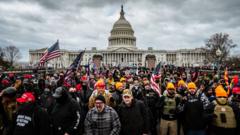An Indiana man who received a pardon from former President Donald Trump for his role in the January 6 Capitol riot has been killed by police during a traffic stop just days after his release. Matthew Huttle, 42, was shot on Sunday after an encounter that resulted in what officials described as an "altercation" following a traffic stop. The Indiana State Police (ISP) reported that Huttle had a firearm at the time of the incident, although details surrounding the reason for his arrest remain unclear.
Huttle was among nearly 1,600 individuals who were granted pardons or commutations by Trump for their actions during the Capitol uprising, which saw supporters storm the federal building in Washington, D.C. in January 2021. His six-month prison sentence was part of a plea agreement he reached, leading to his release in July 2024. Huttle was noted to have spent approximately ten minutes in the Capitol during the riot.
The officer involved in the shooting has been placed on paid administrative leave as the investigation is set to unfold. Jasper County Sheriff Patrick Williamson has requested the ISP to conduct a thorough inquiry into the incident.
In previous statements, Huttle's uncle Dale expressed no remorse for their participation in the riot, characterizing their involvement as a patriotic duty. This incident highlights ongoing concerns about the behavior of individuals involved in the January 6 insurrection, as another pardoned rioter, Daniel Bell of Florida, was rearrested on federal gun charges just last week.
Criticism of Trump's pardons continues to mount, especially among public officials. Republican Senator Lindsey Graham has called it a "mistake" to issue pardons to those who engaged violently with law enforcement during the riot. Trump's remarks during the pardon announcement suggested that he viewed the consequences faced by these individuals as unjust, asserting that the treatment of January 6 participants was unprecedented in U.S. history.
The fallout from the pardons raises complex legal and ethical questions about accountability and the repercussions of actions taken during one of the most chaotic events in recent American history.




















